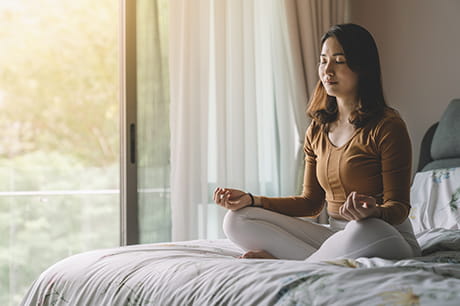9 surprising health benefits of meditation
A daily meditation practice can help your sleep habits, creativity and even your immune system.
Life can be chaotic. There are appointments to make, kiddos to chauffeur, bills to pay... the list goes on. But how often do you stop to be in the moment rather than thinking about what’s next?
If you’re feeling like you need a break, meditating could help. But even if you aren’t stressed out, the benefits of meditation go way beyond relaxation.
What is meditation?
In simple terms, meditation is a practice that trains your mind to focus on the present and find calm in the chaos.
“When we meditate, we ‘press pause’ and redirect our attention on the here and now,” explains Tracy Hacker, behavioral health case manager at Geisinger Health Plan. “It’s a skill that can help you develop a better awareness of yourself and all that’s going on around you.”
You might be thinking, “Sounds great! But how am I supposed to turn off all the thoughts running through my brain?” Ms. Hacker’s answer: You don’t have to.
“It’s a common misconception that meditating equals not thinking,” explains Ms. Hacker. “Rather than emptying your mind, you observe your thoughts, accept them as they are and refocus your attention on an anchor point like your breath, a mantra or a visualization.”
What are the benefits of meditation?
This simple habit has been proven to have big effects on your mental and physical health. Here are some of the benefits of meditation you may or may not know about:
1. Reduces stress
You probably already know meditation can reduce stress. (It’s one of the most common reasons people start, after all.) But the stress relief isn’t all in your head — it happens on a molecular level.
“Research has shown that mindfulness meditation can lower levels of cortisol, one of the hormones that pumps through your body when you’re in a stressful or dangerous situation,” explains Ms. Hacker.
High levels of cortisol over an extended period can increase your risk of heart disease, stomach upset, headaches, weight gain and more. Meditation is an easy way to keep that in check.
2. Lowers blood pressure
If left unchecked, long-term stress can increase your blood pressure, which can increase your risk of heart disease.
Because of its effect on cortisol, meditation could help lower blood pressure when used with other stress reduction techniques.
3. Helps with anxiety and depression
Besides helping with stress, meditation has also been proven to help manage the symptoms of anxiety and depression.
“Several studies have shown that meditation can reduce worries, improve well-being and promote positive outlooks in people with anxiety and depression,” explains Ms. Hacker. “But keep in mind that it's best used alongside traditional medical care rather than as a replacement.”
4. Supports management of addiction and cravings
Because meditation hones your awareness and trains your brain to redirect your attention, a growing number of studies show it can be a beneficial addition to addiction treatment.
“When you meditate, you’re observing your thoughts and feelings without letting them overwhelm you,” says Ms. Hacker. “This same self-control and focus can be applied to urges and addictions.”
It could also help curb cravings to binge eat or give in to other unhealthy coping mechanisms. “More research is needed, but mindfulness meditation could help people accept their emotions without judgment rather than stress eating as a way to cope,” says Ms. Hacker.
5. Strengthens immune system
Yep, you read that right. Consistent meditation could help keep you healthy.
“The research is still new, but there’s growing evidence that suggests meditation can help boost your body’s immune system and promote healthier aging,” Ms. Hacker says. “You shouldn’t skip regular visits with your doctor or stop taking medications, but meditation is a habit that can help keep you well.”
6. Eases pain
Inflammation and chronic pain are common with diabetes, heart disease, arthritis and cancer. Researchers have discovered that meditation can reduce inflammation and help make chronic pain more manageable.
“It doesn’t necessarily take the pain away, but it can make it easier to cope and improve your quality of life,” explains Ms. Hacker.
7. Improves sleep quality
If you’re tossing and turning at night because of worries and thoughts, maybe try a quick bedtime meditation.
Because it promotes calmness and deep breathing, it can help relax your mind on the occasional restless night. Studies have shown that people who meditate fall asleep faster and get better quality sleep than those who don’t.
8. Boosts memory in older adults
Some forgetfulness is normal, especially as you get older. But if you’re looking for ways to boost your memory and potentially prevent Alzheimer’s disease or dementia, give meditation a try.
“Research has shown that adults at risk of Alzheimer’s disease can improve their memory and thinking by spending 12 minutes each day practicing Kirtan Kriya, a type of meditation that uses repeated phrases, hand motions and visualizations,” Ms. Hacker says. “In general, learning a new skill like meditation can be a good way to keep your brain sharp.”
As a bonus, it could also help caregivers of older adults reduce their stress.
9. Promotes creativity
Next time you’re facing writer’s block or a complex problem, meditation could be just the boost you need.
A variety of studies have shown that mindfulness meditation can make people more willing to accept new ideas and ways of thinking. “When you pause to let your thoughts come and go without judgment, you’re using the same parts of your brain you would use to brainstorm a creative solution or new perspective,” says Ms. Hacker.
Starting your practice
The best thing about meditation? It’s free and anyone can do it.
To start, try sitting comfortably in a quiet area, closing your eyes and focusing on your breath while allowing thoughts to come and go. Practice this for a few minutes each day, gradually extending the duration as it gets easier.
You could also try a guided meditation from YouTube, your voice assistant at home or a free app.
“The Department of Veterans Affairs offers a variety of free mental health and mindfulness apps,” suggests Ms. Hacker. “While some of these apps are designed specifically for veterans, there are a lot of great options for the general public, too.”
Keep in mind, meditation isn’t a cure-all, and you might not see the benefits overnight.
“If you’re feeling overwhelmed by stress or are having other health symptoms, it’s a good idea to reach out to your primary care physician or a mental health professional,” says Ms. Hacker. “They can help you pinpoint the source and come up with solutions in addition to meditation.”
Next steps:
Find out how meditation changes your brain waves for the better
Want to live to 100? See how lifestyle choices like meditation could contribute to longevity
Sundays don’t have to be scary. Learn how you can beat the Sunday blues





